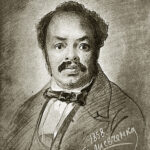20 June 1817: Lines spoken by the actor Alexander Cummins at the Leeds Theatre are enacted sooner than he might have wished
Anon. 1817. Further Remarks on the Theatre, Occasioned by the Awful Death of Mr. Cummins. Leeds: G. Wright. Get it:
.Unedited excerpt
If an excerpt is used in the book, it will be shorter, edited and, where applicable, translated.
Nor can I conclude this trifle, with a better example, than the one left you, by the gentleman who has unfortunately furnished our enemies with an opportunity of intruding their attacks upon your profession – who have made his death the stalking-horse, to cover opinions as erroneous, as they are illiberal.
Mr. Cummins joined the York Company about the year 1775; he came a married man. He occupied for a number of years, the higher walks of tragedy, with credit to himself, satisfaction to his employer, and pleasure to his audience.
He was a contemporary with Mr. Kemble, and Mrs. Siddons. He held the even tenor of his course for forty-two years, respected by all; his time completely occupied by the duties of his profession, and the enjoyment of his domesticated comforts.
His attention to his business was highly praise-worthy; so assiduous was he, in the pursuit of it, that regularity and Cummins were almost synonymous.
In the early part of his life, he mixed a great deal with a most respectable circle of friends in every town. Latterly he confined himself almost entirely to the theatre and his own fire-side. In 1813, he buried, at Hull, the constant companion and partaker of his comforts and disquietudes for upwards of forty years.
He laboured for a length of time, under severe pain, which he endured with amazing constancy and firmness. The nature of his disorder prevented him from sleeping in any other than that of a sitting posture. His medical friends determined the disease to be an ossification of the heart, candidly informing him, that it would, most probably, end fatally and suddenly. He received the sentence with composure, and it was never known to affect his spirits, or upon any occasion to cast a gloom over his naturally, cheerful habits.
On Friday evening, June the 20th, it pleased the Almighty to issue the awful fiat. Just as he was closing the character of Dumont, in Jane Shore [Nicholas Rowe], with the extraordinary words:
Be witness for me, ye celestial host,
Such mercy, and such pardon, as my soul
Accords to thee, and begs of Heaven to shew thee,
May such befall me at my latest hour,
he fell backwards into the arms of the gentleman who was performing Belmour, and instantly expired. The transit from life to death, was so gentle, and so sudden, as scarcely to be perceptible to those immediately surrounding him. For two hours after the event, his countenance retained a placid kind of smile, which perfectly evinced there had been no struggle in the casting off the clog to the immortal spark.
He has left an unprovided, unprotected daughter. To the liberal and generous, no other appeal will be requisite. Let us hope, that charity is not so extinct in the breasts of the stage adversaries as to make them persevere in personal, illiberal allusions, and thus attempt to weaken the interest all should feel for a helpless, defenceless woman.
Leeds, July 18, 1817.
Comment
Comment
The above pamphlet is a response to Methodist schadenfreude like “The providence of God asserted”:
Some persons are of opinion that these men are really gone to “another and a better world.” I shall not pretend to say anything pro or con upon so delicate a subject; but may I not inquire, who would choose to die in a play-house? It is true that death may meet us in every situation, but a theatre is probably the last place where a thoughtful person would choose to meet his end (Basden 1818).
Cummins was known for his delivery:
This favourite of York Theatre was remarkable for a voice of extraordinary strength. The power he possessed seduced him into the habit of ranting, which the public, being pleased with, confirmed him in. Thus, when John Kemble visited York, he was told by the gallery he “cud na shoot oot laik Coomens.” (Pry 1835)
Leeds Libraries hold a (copyrighted!) image of the playbill.
Something to say? Get in touch
Similar
 3 January 1638: On the eve of the civil war, Henry Slingsby witnesses Royalist cavalry exercising near Wetherby on Bramham Moor, scene of the defeat of the Percy Rebellion in 1408
3 January 1638: On the eve of the civil war, Henry Slingsby witnesses Royalist cavalry exercising near Wetherby on Bramham Moor, scene of the defeat of the Percy Rebellion in 1408 16 August 1845: The York Herald is conned into posting the American actor Ira Aldridge’s sensational account of his own death
16 August 1845: The York Herald is conned into posting the American actor Ira Aldridge’s sensational account of his own death 24 January 1826: Samuel Hick, blacksmith and Methodist preacher of Micklefield (Leeds), writes to his “dear bosom frend and beloved wife” and daughter Jan
24 January 1826: Samuel Hick, blacksmith and Methodist preacher of Micklefield (Leeds), writes to his “dear bosom frend and beloved wife” and daughter Jan
Comment
Comment
How much is Kitson influenced by the description of the village band in Thomas Hardy’s Under the Greenwood Tree, published 16 years before?
Something to say? Get in touch
Search
Donate
Music & books
Place-People-Play: Childcare (and the Kazookestra) on the Headingley/Weetwood borders next to Meanwood Park.
Music from and about Yorkshire by Leeds's Singing Organ-Grinder.


 Bluesky
Bluesky Extwitter
Extwitter